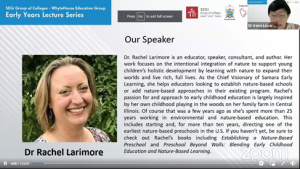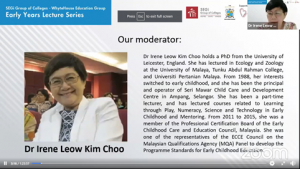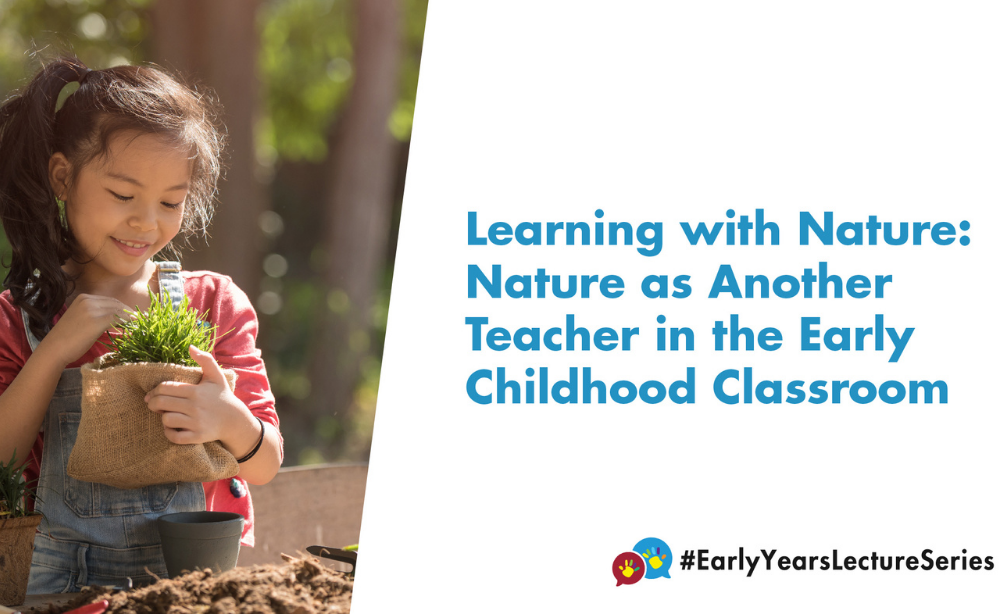
SEGi Group of Colleges is thrilled to have successfully held a special webinar under the auspices of our Faculty of Education, and under the stewardship of our Carolyn Choo, associate dean, joint faculties – Education. Our SEGi Group of Colleges-Whytehouese Education Group Early Years lecture series kicked off with Dr Rachel Larimore’s ‘Learning with Nature: Nature as Another Teacher in the Early Childhood Classroom’ on 24th September at 8pm.
Dr Rachel A Larimore is an educator, speaker, and consultant focused on the integration of nature into early childhood education. Her newest book, Preschool Beyond Walls: Blending Early Childhood Education and Nature-based Learning, focuses on teaching practices fundamental to the nature-based approach.

Dr Larimore’s session covered the principles of the nature-based approach to the education of children and offers tangible ways with which teachers can begin to integrate nature into their classrooms. This webinar received overwhelming response from parents, practitioners, students, alumni members and members of the public, all whom were riveted to their seats as they listened to her speak. Over a thousand participants registered and over three thousand joined the session on Zoom. Earlier this year at the ECCE Council Malaysia’s Virtual Early Childhood Education Conference on ‘Learning Beyond Walls: Integrating Nature into the Early Childhood Classroom’, Dr Larimore delivered her thought-provoking insights, and again at this webinar. Dr Larimore is very passionate in her quest to integrate nature into development of young children’s holistic development.
Dr Larimore addressed the following in her lecture: why nature is crucial, what nature-based education is, and how we can encourage learning with nature, its programme structure, the physical environment, and teacher-child interactions.
Dr Larimore stressed the importance of nature’s contribution to children’s learning and development. Nature is another teacher and as a learning tool, is a necessary part of the curriculum, and she is beneficial to the holistic and healthy development of every child everywhere.
As humans, we are unavoidably connected to nature, and as humans and the nature in which we exist, we necessarily impact on each other. Children learn by experiencing the natural world, and this teaches them to build a natural relationship with the world, learning to care for it and to protect it. This is a process of “building lifelong stewards” in our young.
Nature-based education, as Dr Larimore explained, is a blend of early childhood education and environmental education, which is core to teaching and learning, a learning which is based on learning through children’s experiences with and within nature. This education should be both play-based and child-led, which means creating activities based on children’s interests, through interacting with people in their socio-cultural world.
The participants of the webinar were reminded that nature is all around us, and learned from Dr Larimore that there are three types of learning in the nature-based pedagogy. Nature-based education is very much about learning with nature, rather than in or about nature.
Learning in nature means being physically outdoors, mostly teacher-led. Children are not dependent on nature for learning to occur, nor does this mean that they need necessarily to connect with the world around us. It may simply mean moving indoor learning activities to the outdoors.
Learning about nature is the cognitive learning and knowledge of the facts about nature, and this may be either indoors or outdoors, mostly teacher-led, and may build over time.
Learning with nature, which is the ultimate goal, is almost always physically outdoors, and this has to do with discovery, ab and activity which is mostly child-led. Learning emerges from experience, and gives meaning to learning about nature, based on our children’s interests. These build over time, and nature as another teacher means that children learn with adults’ guidance, but they are the leaders. In this manner, child’s play, as risky as it may seem, is an important part of learning. An integral part of this learning is extensive daily outdoor time, a child-driven emergent curriculum (using children’s interest to guide activities, including the learning spaces of the classroom, outside and beyond the classroom, and encouraging play using natural materials.)
The participants of the webinar took with them many practical tips on learning with nature as shared by Dr Larimore. These include the programme structure (ways to organize class days focusing on learning with nature), moving outside-time to the beginning of the day (creating an opportunity for children to spend more time outside of the classroom), and doing more things outside (going outside in all weathers, including daily excursions in the ‘beyond’).
Dr Larimore also talked about organizing the physical environment, teaching inside but bringing nature into the classroom. This generally means more human-made than natural materials, but teachers are encouraged to use more natural over manufactured materials. These include using authentic versus cartoon-like materials, avoiding stereotyping when selecting materials, representing local nature (for example, the Malaysian Early Childhood classroom should be different from the one in the US), connecting the indoors to the outdoors, and taking advantage of math and science-learning opportunities.
In the physical environment, which is outside in the natural play area, there is an even balance between natural and human-made materials, and a world of opportunities which children can manipulate and learn from.
The physical environment (beyond the fence) contains many more natural materials versus human-made ones, and non-human elements as another teacher will open children’s eyes and minds to immense knowledge.
Dr Larimore also spoke about teacher-child interactions, especially the importance of being able to connect children’s inside, outside and beyond experiences, understanding that learning with nature connects to literacy, which will be emergent in writing, math, learning about patterns, leave shapes, comparing and contrasting, prediction, and a wealth of other learning experiences.
Dr Larimore added that children’s experience with nature is very much dependent on adults’ attitudes as well, for example, their enthusiasm about nature, their willingness to embrace child-led emergent learning, and their support of risky play.
Dr Leow, the moderator for the session, principal and operator of a child care and development centre in KL and a very active member of the ECCE Council, agreed too, that teachers must be comfortable with going outdoors themselves and bringing their young students there. They may begin with spending more time outdoors, for example, in the play area, and building their confidence of being outside with the children. Adults could demonstrate to children their own curiosity of the world as they are also learners themselves, and engage the children by asking open-ended questions or simply talking less and just having the children observe nature.
In responding to parents’/families’ concerns about children going outdoors during the Q&A session, she encouraged participants to bring the family along, for example, on a journey to educate them on why it is important for children’s development, reassuring the family that children are not put into unsafe situations. There will have to be clear communications with them on why this being done, for example, through school marketing materials, family orientation handbooks or newsletters, to show that the outdoor experience is part of school, what the school policy or protocol is on this, and how to keep the children safe.
Dr Leow concluded that our connectedness to nature and learning with nature allows young children to grow up to respect and conserve nature, ensuring the sustainability of the environment, enabling them to learn to find solutions to world issues such as climate change and global warming.

You may watch the replay of the live series >>here<<
The EY lecture series continued with Dr Lasse Lipponen’s ‘A Peek into Finnish Education: Sharing Practices that Can Transform the Malaysian Early Childhood Services” on 15 October at 8pm.
If you are interested to attend our next sessions, be sure to sign up for our next session by clicking on the link here: https://www.eventbrite.com/e/176812439767
Needless to say, this was an overwhelmingly successful webinar that spoke volumes to the participants, and left everyone thoroughly educated, informed and entertained. SEGi College is proud to have been instrumental in this webinar and promises to bring many more such elucidating sessions in the near future.

